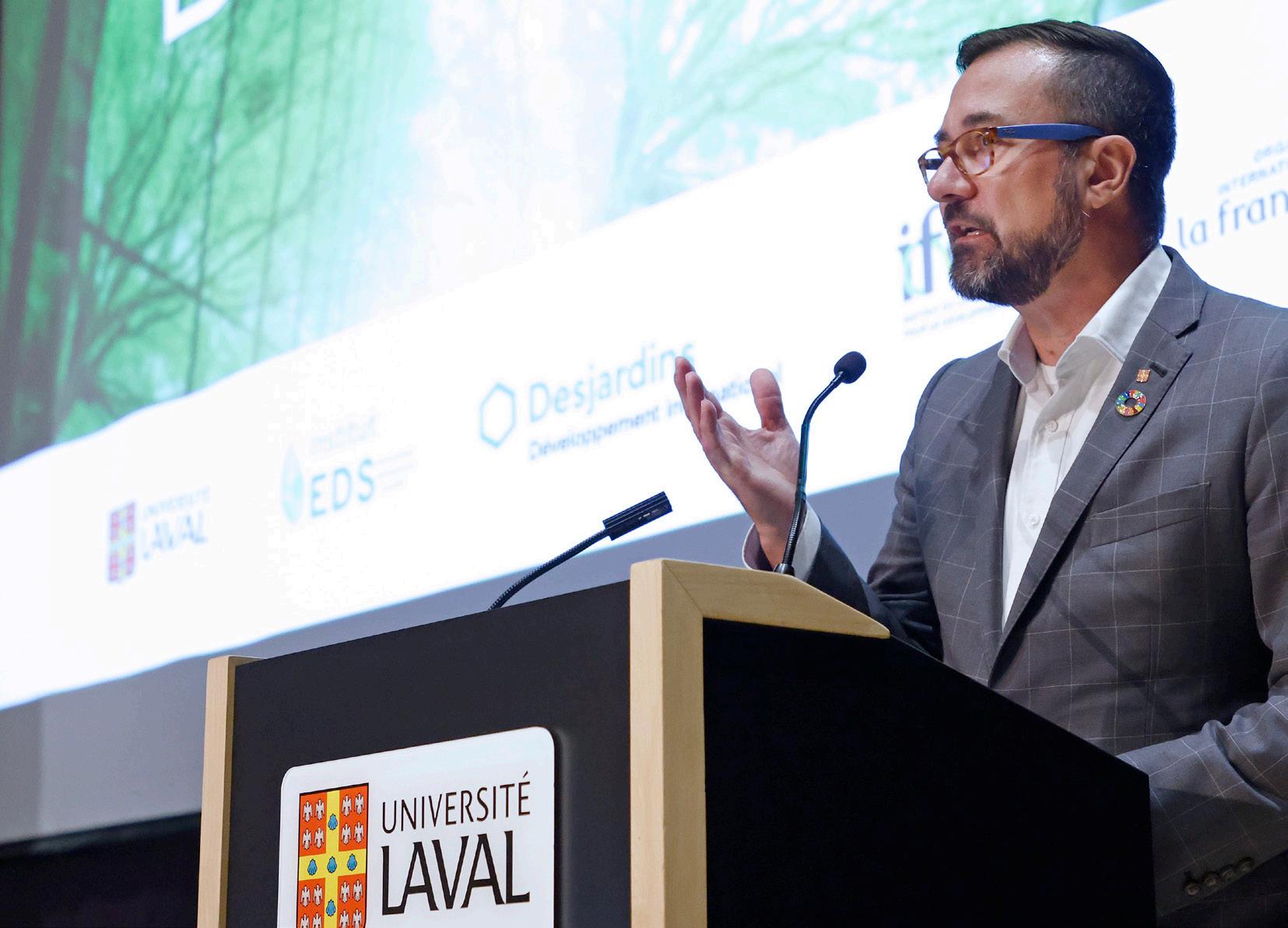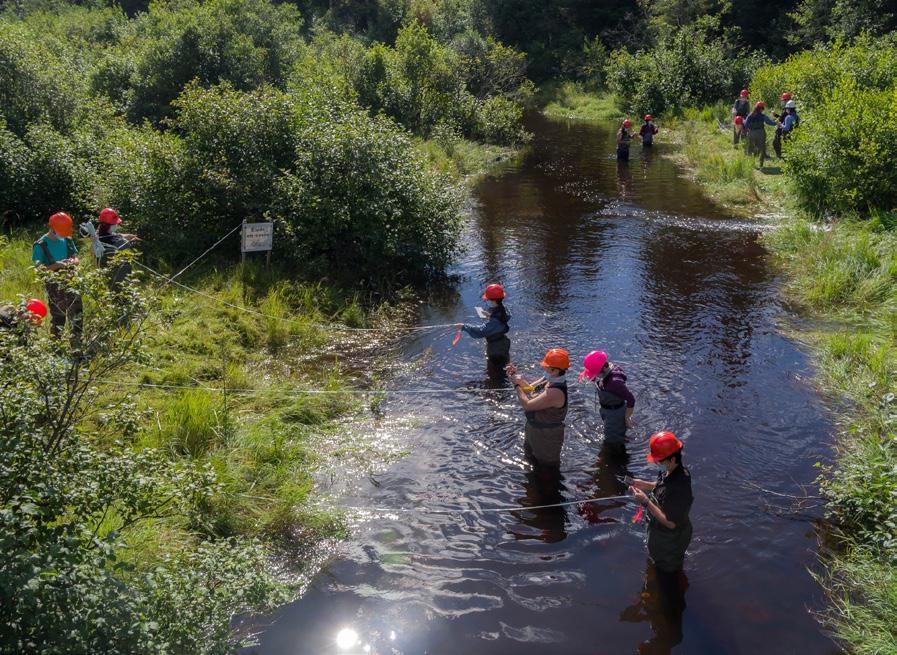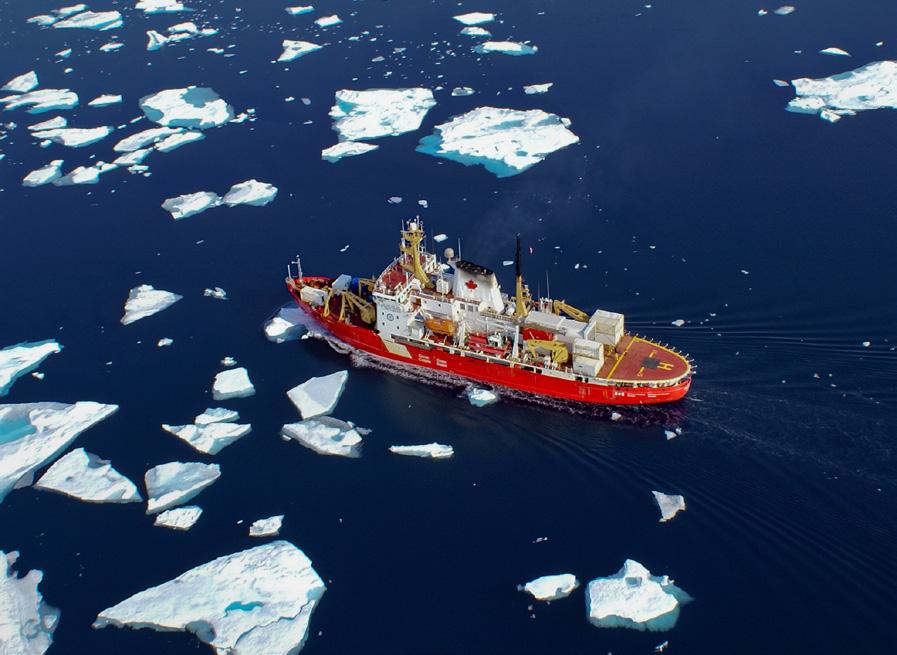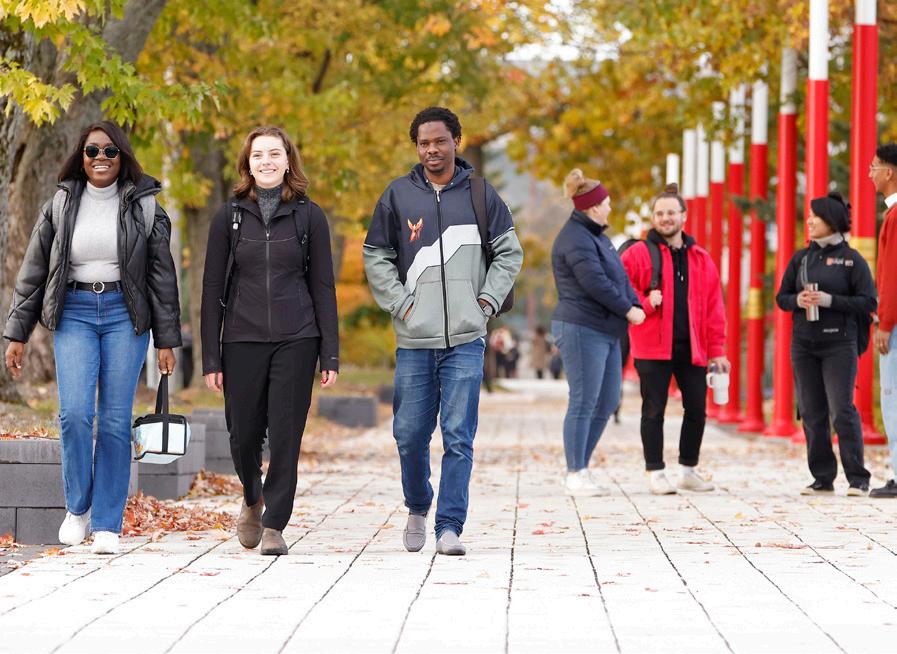
4 minute read
Local Engagement, Global Impact: Université Laval’s Leadership in Climate Action
Educating Climate Leaders
“One of the most effective ways to combat climate change is through education and the sharing of knowledge,” says Vice Rector Gélineau.
Recognizing this, Université Laval’s Sustainable Development Profile, available across numerous academic programs, equips students with the tools to address complex sustainability challenges aligned with the United Nations’ 17 Sustainable Development Goals (SDGs).
In 2023 alone, over 315 courses integrated SDG 13 (Climate Action), reaching more than 15,650 students.
The university also offers a unique interdisciplinary master’s program— Chantier d’avenir en action climatique (Climate Action Initiative for the Future)—designed to train future leaders capable of guiding organizations and communities through the climate transition.
Research for a Sustainable Future
Université Laval has taken the same approach in supporting research, creation, and innovation initiatives for the benefit of communities and the planet.
“Our vision revolves around three strategic priorities – fostering inclusive research that values a diversity of perspectives and disciplines; enabling connected, socially engaged research that leverages digital technologies; and promoting sustainable research aligned with the United Nations SDGs,” Gélineau said.
Between 2017 and 2021, faculty produced 492 publications related to SDG 13, according to Elsevier bibliometric data.
A cornerstone of this effort is the Institut Environnement, Développement et Société (EDS Institute), founded in 2004. This interdisciplinary hub fosters solution-oriented research, public engagement, and lifelong learning. One of its flagship initiatives, the Mouvement des entreprises vertes (Green Business Movement), supports the ecological transition of businesses in the Québec City region, promoting sustainable practices and energy innovation.
Another standout initiative is Sentinel North, a cross-disciplinary research and training program coordinated by Université Laval. Over the past decade, it has united more than 200 researchers, 700 students, and 40 ministries and international partners from 20 countries. Its 90 research teams address critical issues such as permafrost thaw, Arctic biodiversity, and sustainable development in northern communities.
“Thanks to Sentinel North’s work, Université Laval has become a leader in understanding the rapidly changing northern environment and its impacts on ecosystems, human health, and infrastructure at the northern and global levels. This is of fundamental importance,” said Gélineau.
Université Laval also manages the Montmorency Forest, the world’s largest teaching and research forest. Spanning 397 square kilometers, it serves as a living laboratory for boreal ecosystem research and sustainable forest management. It is used for education, research, and public awareness. Researchers are collecting real-time data and experimenting with sustainable forest management practices.
Institutional Commitment
Université Laval’s 2023–2028 strategic plan places climate action at the heart of its teaching, research, governance, and community engagement.
“Our approach to reducing carbon emissions, transitioning to renewable energy, and adapting to climate change is grounded in four key actions: measuring, reducing, offsetting, and adapting,” explains Gélineau.
Since 2015, the university has achieved carbon neutrality, with compensation, for its Scope 1 and 2 greenhouse gas emissions. It aims to reduce emissions by 70% from 2006 levels by 2030, in line with global efforts to limit warming to 1.5°C.
The university’s sustainable investment strategy is equally ambitious. It targets a 30% reduction in the carbon footprint of its equity portfolio by 2025 and 50% by 2030. This is achieved by limiting exposure to fossil fuel reserves and prioritizing investments aligned with the UN Principles for Responsible Investment.
Université Laval also plans to reduce its energy intensity by 20% by 2030 (compared to 2012–13 levels) and transition to 100% renewable energy by 2035.
Empowering the Community
“Our greatest success is the mobilization of our community— students, faculty, staff, and partners— around climate action,” says Gélineau.
The university fosters engagement through awareness campaigns, participatory workshops, and partnerships with external organizations. These initiatives are designed to meet real societal needs and create lasting impact.
A key element of this approach is the University’s ability to build strong partnerships with external organizations from all sectors of society. These climate initiatives must be based on real needs and have a genuine societal impact.
“This community engagement and partnership fosters a shared sense of responsibility and prepares our community members to be agents of change in their field, and beyond,” Gélineau said.
Global Recognition and Collaboration
Université Laval’s efforts have earned it global recognition. Since 2022, it has ranked among the top 2% of universities in the Times Higher Education Impact Rankings. In 2023, it reached the prestigious STARS (Sustainability Tracking, Assessment and Rating System) Platinum rating, one of the highest distinctions for sustainability in higher education.
The university also leads UniC, an international academic network for climate action. With over 1,700 students from 60+ countries, UniC fosters collaboration through workshops, events, and participation in global forums such as the Climate Week NYC.
Université Laval is an active participant in the UNFCCC COP process, sending student and faculty delegations to recent conferences including COP28 in Dubai and COP29 in Baku. These engagements reinforce its commitment to experiential learning and global climate leadership.
A Call to Action
“As the climate crisis intensifies, the role of universities as agents of change has never been more critical,” says Gélineau. “Université Laval embraces this responsibility by embedding sustainability into every aspect of its mission.”
Over the past two decades, the university has transformed its vision into action—educating future leaders, advancing climate science, and building a more resilient and equitable world.
“We invite individuals and organizations everywhere to join us on this collective journey toward meaningful climate action.” ■
François Gélineau is Vice Rector, International Affairs and Sustainable Development at Université Laval.
Université Laval: Located in the heart of Québec City—a UNESCO World Heritage site celebrated for its rich history and natural beauty—Université Laval is a thriving academic community of 65,000 students, faculty, and staff. Rooted in a northern identity shaped by the rhythms of the seasons and a spirit of resilience, the university has cultivated a deep commitment to sustainability. As the oldest francophone university in the Americas, Université Laval has emerged as a global leader in climate action and sustainable development, driven by a collective vision to shape a more just and resilient future.














